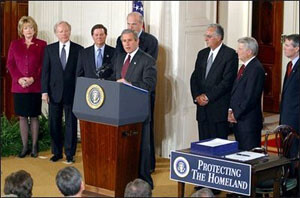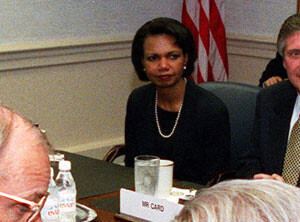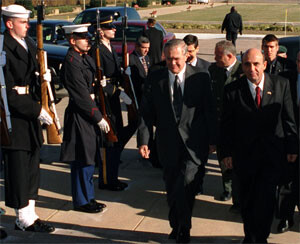The Electronic Intifada 30 March 2003

Above: President Bush addresses the media during the signing of the Homeland Security Act of 2002 in the East Room Nov. 2, 2002. (Paul Morse)
Nine Palestinians have been killed in the West Bank and Gaza in the days since war in Iraq started, including a 10-year-old girl in Bethlehem, and two boys in Jenin; one 12 and the other 15. Last Friday, in the village of Doha, near Bethlehem, Israeli forces destroyed the family home of Mohammad Dar-Yasin, who tried to carry out a suicide bombing in a nearby Jewish settlement in February last year but was shot and killed.
The Israeli government, meanwhile, is continuing its work on the fence designed to keep Palestinians from Israelis. Last Sunday, the Israeli defense ministry recommended altering the original plans and building the fence deeper in the West Bank. Israel began constructing the fence last year to run along the ‘Green Line,’ which demarcated the frontier before Israel occupied the West Bank in the 1967 war. Moving the fence would mean including about 40,000 more Jewish settlers and 3,000 more Palestinians on the western, “Israeli” side.

Above: British PM Tony Blair welcomes US President George Bush to a meeting in Chequers in England, July 2001. (Eric Draper)
For Blair, this is a much more important political objective than for Bush. Blair has put his credibility in Britain at stake with his position on the Iraq war, with many in his own party and in the country opposed. But with a credible and serious push for Palestinian-Israeli peace, Blair can tell his critics that he is, indeed, pursuing an even-handed approach in the Middle East, and, more subtly, say that this vindicates his support for the US on Iraq.
The problem is that any successful resolution of the Israeli-Palestinian conflict does not depend on Blair: it depends on the seriousness with which the US is prepared to pursue it. This, in turn, will depend on the seriousness with which the US is prepared to confront Israel. The signs are not good.

Above: National Security Advisor Condoleeza Rice. (Helene C. Stikkel/DoD)
With respect to the road map, Israeli Prime Minister Ariel Sharon has already submitted some 100 proposed changes. According to the Israeli newspaper Ha’aretz, Israel has some 20 “substantial” reservations, which it will insist on and sees as “cast in iron.” These include:
In effect, Israel wants a road map to preclude any serious negotiation for any serious settlement. Next Tuesday, some 3,000 Jewish-American activists are expected at Capitol Hill to lobby Congress to continue its support for Israel. Sharon has already boasted that Israel “owns Congress,” so chances are that they will be successful.

Above: Secretary of Defense Donald H. Rumsfeld escorts Israeli Minister of Defense Shaul Mofaz into the Pentagon, December 2002. (Helene C. Stikkel/DoD)
The Bush administration has stated its belief that the key to Middle East stability lies in the democratization of Arab countries, by hook or by crook. What it apparently fails to realize is that democratic Arab countries will be much less likely to accept peace with Israel on Israeli terms than current regimes so much more pliable to US whims. There is not a single Arab out there not aware of the fact that the US partly justified its war with Iraq on the basis that Saddam Hussein has ignored 17 UN resolutions, but that Israel has ignored 64 yet no action is taken. The ‘Arab street’ would not accept a Palestinian state on anything less than all the land Israel occupied after the 1967 war, and even then, Arabs would also insist on the right of return of Palestinian refugees.
The US appears to be the only country in the world that fails to realize the centrality of the Palestinian-Israeli conflict for Middle East peace. It appears that the road map this administration is navigating by will take it to Baghdad, Damascus, Tehran and Riyadh before it realizes that all roads lead to Jerusalem. That’s a long route to take.
Omar Karmi is a former op-ed editor of the Jordan Times, now a Chicago-based freelance journalist. This article appears in the April 2003 edition of F News.





